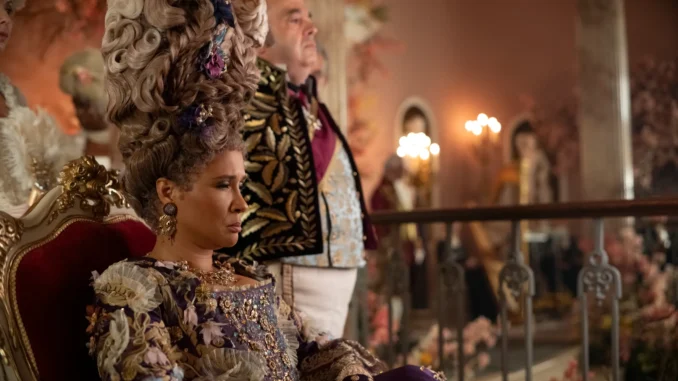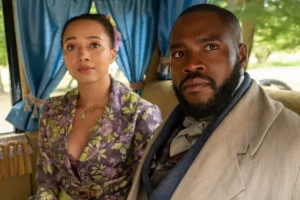
Bridgerton’s third season is gauzier than ever. Should we still be holding it accountable?
With the recent Netflix drop, Bridgerton’s color-conscious casting enters its third season, and we still have many of the same questions for the series that we had at the beginning. What impact does this casting have on our storyline, if any? Does the injection of so many characters of color add complexity to our understanding of the Bridgerton universe, or is this casting ultimately less than window dressing for the same old crusty patriarchal tropes?
Bridgerton is almost — but not quite — an alternate historical universe, one where a colorblind view of society prevails. This slight historical rewrite posits that Queen Charlotte, who was the real wife of Britain’s King George III, is a Black aristocrat who married into the British royal family and presides over society in all her glory. That thin historical tie, along with the show’s season-one acknowledgment that slavery exists in this universe, has always complicated how we understand the diversity of the religion (Bridgerton-speak for society). Season one, indeed, drew criticism for “having Black people strolling around in the background” without giving most of the show’s Black characters meaningful identities or storylines.
Season two expanded the number of minority characters and gave two of them the show’s focal storyline, but did little to address the concerns held over from season one about the lack of complexity in this universe. Granted, romance as a genre is all about escapism; but how can the show simultaneously tell us that class and racial inequalities exist while usually pretending they don’t?

Season three, rather than attempting to reconcile this paradox, has simply flung more characters into it. And while it’s a lot more fun to have even more characters of color strolling around in the background, the show still largely configures them all as shallow and undeveloped.
Bridgerton’s Black men are all isolated within their society
Bridgerton frankly enjoys its surface pleasures, and season three has chosen to go wide, not deep. We’re introduced to a truly dizzying number of new characters and relationships — everyone from lead character Penelope’s (Nicola Coughlan) dueling love interests to Marcus Anderson (Daniel Francis), cane-tapping Lady Danbury’s (Adjoa Andoh) surprise brother. He appears and immediately develops a flirtation with Danbury’s bestie, widower Lady Bridgerton (Ruth Gemmell), who’s one of four Bridgertons looking for love this season. (Anthony, who married his love Kate last season, also makes an appearance.)
Among them, another unexpected sibling, Francesca (Hannah Dodd), who was previously played by a different actress in a much smaller version of the role, returns from Bath just in time to make an amiable connection with the quiet, quirky but charming John Stirling (Victor Alli), a little-known earl who seems destined to easily win her hand. Francesca and her mother seem to represent opposite ends of the marriage spectrum: Lady Violet wants all of her children to make a love match like she did with her late husband, but Francesca seems perfectly content to make a convenient marriage based on her friendship with the earl.
What’s less clear is what either man hopes to gain from wooing a Bridgerton. Lady Danbury seems to be wary of Marcus, with the vague implication that he might be a rake, but he gets so little screen time that we barely get any sense of his character beyond his shallow banter with Violet. John, by contrast, gets one of the more interesting arcs of the season — if you can call awkward courtship an arc. Both get sidelined by a script that has too many characters to cycle through and not enough time to devote to giving them all three dimensions.
Additionally, as Black gentlemen of the ton, both men appear to be disconnected from the society they’re moving within. Marcus has arrived from out of town and no one seems to know him apart from Lady Danbury. John likewise seems to have come to town specifically to tour the marriage mart — no one among the Bridgerton families seems to know him at all. His apparent neurodivergence further sets him apart from their sphere, at least initially.
It’s unclear whether the writers intended both characters to feel this isolated, or whether it’s a byproduct of the show’s divided attention, but the result leaves us questioned what role Black men actually play in this society, and how integrated they actually are within it. Recall that our season one hero, Simon (Regé-Jean Page), was also a solitary figure within his set whose best friend, Will Mondrich (Martins Imhangbe), was a working-class boxer who bonded with him through the military.